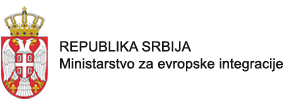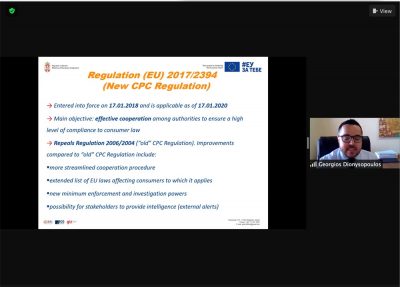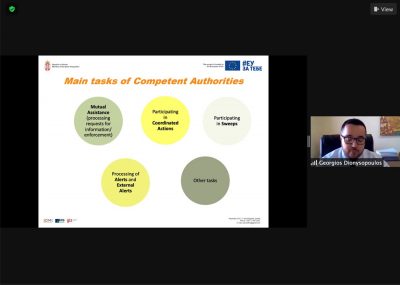Chapter 28: Improving cooperation between national authorities in the field of consumer protection

As part of the activities in the areas related to the Negotiating Chapter 28, PLAC III project has provided support to the Ministry of Trade, Tourism and Telecommunications in improving the capacity for consumer protection and getting acquainted with the latest EU laws on cooperation of national authorities responsible for the enforcement of consumer protection laws.
In the European Union, cooperation between competent national consumer protection authorities is regulated by the Regulation 2017/2394, which entered into force in January 2018, and has been applied since January 2020. Its main objective is to achieve effective cooperation between national authorities in order to ensure a high degree of conformity of consumer protection in the internal market. The reasons for the adoption of the new Regulation were the increase in online commerce and the problems of law enforcement on consumer protection, which arose in cross-border cases. The Regulation enables better cooperation of national authorities, the list of EU laws has been expanded, competencies related to investigative actions have been introduced, as weel as the possibility of involving of consumer associations.
Project expert George Dyonisopoulos presented the Regulation and recommendations for the Republic of Serbia for the purpose of its implementation at a workshop held on 27 May 2021. He said that for the application of the Regulation, there must be a cross-border case, ie that the violation of consumer rights must occur across borders. The Regulation defines three types of consumer rights infringements: intra-EU, involving two countries, then a wide range infringement (involving at least three Member States) and large-scale EU-dimension one (at least two thirds of the total EU population are affected).
Member States are required to establish a Single Liaison Office, designate competent authorities and establish minimum competences for investigation and enforcement powers. The Regulation is comprehensive and covers unscrupulous consumer practices, banking services, e-commerce and all forms of transport.
Within the project support, an analysis of the existing institutional framework and the way in which institutions in Serbia function in relation to the requirements of the Regulation was conducted. It has been determined that the existing legislation enables resolving infringement cases at the national level, i.e. there are competencies for investigation and enforcement powers, but they need to be extended to cases of unfair contracts, as well as to obtain competencies for removing online content and conducting “mystery shopping”. Notification and reporting obligations should be performed by the future single liaison office, competent authorities and entities entrusted with issuing external warnings.
The workshop was attended by the representatives of the Ministry of Trade, as well as representatives of stakeholders – the Department for Financial Consumer Protection of the National Bank of Serbia, the Digital Agenda and the Directorate of Civil Aviation of the Republic of Serbia.
Relevant EU legislation:
Photo gallery
Recent Posts

Notice
9. April 2024.

The fourth project brochure published
29. March 2024.

The last meeting of the Steering Committee
28. March 2024.
Negotiation chapters
- Chapter 1: Free movement of goods
- Chapter 3: Right of establishment and freedom to provide services
- Chapter 8: Competition policy
- Chapter 9: Financial services
- Chapter 10: Information society and media
- Chapter 11: Agriculture and rural development
- Chapter 12: Food safety, veterinary and phytosanitary policy
- Chapter 13: Fisheries
- Chapter 15: Energy
- Chapter 16: Taxation
- Chapter 27: Environment
- Chapter 28: Consumer and health protection
- Chapter 32: Financial control
- Chapter 33: Financial and budgetary provisions






